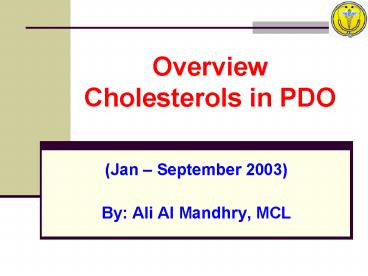Overview Cholesterols in PDO - PowerPoint PPT Presentation
1 / 25
Title:
Overview Cholesterols in PDO
Description:
It is ONE of the MAJOR RISK FACTORS for Heart Disease. ... Tips for Eating smart ... Eat more boiled or grilled fish and skinless chicken breasts. Avoid fried foods. ... – PowerPoint PPT presentation
Number of Views:50
Avg rating:3.0/5.0
Title: Overview Cholesterols in PDO
1
Overview Cholesterols in PDO
- (Jan September 2003)
- By Ali Al Mandhry, MCL
2
Background
- Cholesterol is a type of FAT (LIPID), found in
the blood and body cells. It is carried in the
blood attached to a protein in the form of LDL
,HDL Triglycerides - It is Essential for many VITAL body functions
- Formation Maintenance of cell membranes
- Formation of several Hormones
- Production of bile salts which help digest food.
- Conversion into Vitamin D in the skin when
exposed to sunlight. - 85 of cholesterol is ENDOGENOUS (Liver), 15
from DIET (Dietary Cholesterol)
3
LDH and HDL are forms in which fat and
cholesterol get transported in the blood
Cholesterol
Triglycerides
Lipoproteins
HDL good
LDL bad
HDL
LDL
VLDL
4
Why is Cholesterol Control important?
- It is ONE of the MAJOR RISK FACTORS for Heart
Disease. - High Cholesterol other fats in the blood can
lead to heart disease Stroke. - It causes a condition Called Atherosclerosis
i.e. Narrowing Hardening of the arteries that
supply the Heart , Brain, Other organs
5
Too much Cholesterol Results in !! ??
LDL
LDL
The problem with cholesterol happens when special
cells catch LDL and deposit the cholesterol out
of it in the walls of the blood vessels. This is
called ARTHEROSCLEROSIS.
6
What a blessing!!
LDL
HDL
HDL usually collects the bad cholesterol and
takes it back to the liver. That is why HDL is
known as good cholesterol. An easy way to
remember that HDL is good HHelp, since HDL helps
collect bad cholesterol and, therefore, helps
prevent heart attack.
LDL
HELP
HDL
7
Recommended level of Total Cholesterol
8
What is HIGH Cholesterol
Total Cholesterol Levels
LDL Cholesterol Levels
- 6.2 mmol/L or more is
- High Cholesterol
- it means you are at increased
- risk for heart disease.
- 4.1 mmol/L or more
- you are at higher risk
- for heart disease
9
Three RISK Categories
Risk Category
LDL- GOAL
Coronary Heart Disease Diabetes
lt 2.6 mmol/L
Multiple (2) risk factors
lt 3.4 mmol/L
Zero to one risk factor
lt 4.1 mmol/L
10
Status of PDO Cholesterol Estimations
11
Total Cholesterol carried out in PDO
12
High Cholesterol in PDO
13
High Cholesterol by Age
14
High Cholesterol by Gender
15
LDL Cholesterol
16
High LDL Cholesterol Jan to Aug 2003 -
17
LDL Cholesterol Jan to Aug 2003 -
18
High LDL Cholesterols Jan to Aug 2003 -
19
High LDL Cholesterols Jan to Aug 2003 -
20
Steps to Prevent High Cholesterol
- Quit Smoking
- Modify Diet
- Reduce Excess Weight
- Increase Physical Activity
- Maintain Normal Blood pressure
- Control Diabetes, Hypothyroidism
21
Tips for Eating smart
- Limit saturated fats, like dairy fats (in ice
cream and butter), palm and coconut oil (in baked
goods) and Red meat and meat products. - Limit high-cholesterol foods, like egg yolks,
organ meats (such as liver) and shellfish. - Eat more fruits and vegetables.
- Eat more boiled or grilled fish and skinless
chicken breasts. - Avoid fried foods.
- Choose lean cuts when you eat beef and lamb. Also
eat smaller portions. - Eat a variety of fibre-rich foods, like oats,
dark breads and apples. - Choose low-fat or non-fat dairy products.
22
Balancing the Equation
Weight gain results from food intake being
greater than physical activity
23
Balancing the Equation
Weight loss results from food intake being less
than physical activity
24
Balancing the Equation
Weight maintenance occurs from food intake
equaling physical activity
25
Thank You































